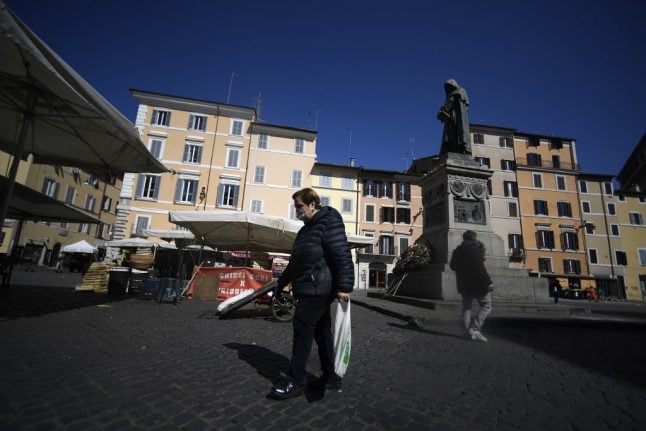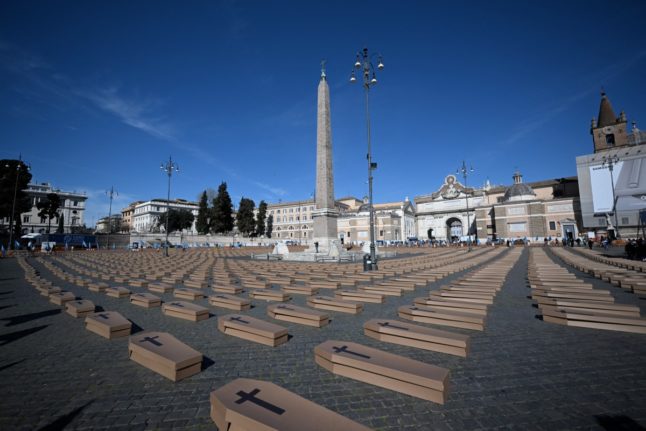Leaning out his window, the dashing octogenarian looks down on the little street in the ancient heart of Rome.
It looks desperately empty, again, and Roberto Fichera could easily not see another human being today — a growing problem in Europe's oldest country.
“I am a homebody and I like to take care of myself,” says Fichera, who might come across the odd stranger at the pharmacy, should he decide to venture out and pick up his pills.
While Italy is a country of seniors — the average age last year was 45.4, higher than anywhere else in Europe — very few of them live in retirement homes.
The downside of such independence is clear during lockdowns that governments are imposing to ward off the invisible killer of thousands around the world.
Almost 3,000 have died of COVID-19 in Italy, which is on course to overtake China this week for the highest number of coronavirus fatalities.
The Mediterranean country's lockdown has been in place for over a week, longer than in any place outside China.

'You hear footsteps'
Fortunately for Fichera, the Monti district where he lives between the Colosseum and the Termini train station is packed with shops.
He can get what he needs on foot, which Fichera considers a “blessing” since he does not drive.
“I take my place in line at the store just like everybody else, respecting the safe distance,” says Fichera, a hale 84-year-old with abundant white hair.
Under the rules, people are urged to stay a metre (a yard) apart, and some stores have yellow tape on the ground, measuring out the distance.
“I am often allowed to jump the queue given my age — and I gladly accept it. For once, being old has an advantage,” he says with a laugh.
Otherwise, the jovial octogenarian tries to keep himself busy by doing the odd chore around the house. He started his spring cleaning a few weeks early this year.
“That kept me busy for a few days,” he says with another wry smile.
Yet all is not well, clearly. The din of the city, comforting to some, overwhelming to others at times, is gone.
“We don't hear noise,” says Fichera. “No cars, the streets are empty…
“When you go out for a walk, you hear footsteps behind you, and you worry.”
“It feels overwhelming, the silence, Fichera says.
“That is what worries me.”

'Be patient'
The Eternal City is celebrated for the stunning harmony between its ancient ruins and Gothic churches graced with mesmerising Renaissance art.
It is a tourist city, a working city, and one where life is celebrated outdoors, in cafes along winding cobblestoned streets.
That life is gone. But in its place, Fichera finds a different Rome, with new, fleeting charms.
“We hear the birds sing, right in the centre. It is amazing!” he says, visibly moved.
The city is suddenly teeming with them, sea gulls with long yellow beaks, now that the people are gone and the cars are silent.
Fichera sleeps like a log, going to bed late at night and waking at around 9:00 am.
On the other side of the Tiber River, not far from the Vatican, Carla Basagni also spends time looking out her window and onto a street that leads to a graceful fountain.
The painter and poet usually watches a continuous flow of tourists, drawn by the Trastevere district's countless bars and restaurants.
The area, normally one of Europe's hottest nightspots, is now a stone desert, lined with metal fencing that covers every display window in sight.
Carla, willowy, fragile, with big dreamy eyes, takes refuge in reading.
“The bookstores are closed and I can't buy anything new. So I decided to re-read old books that opened my mind and touched my heart,” Carla says.
“They help me remember that time is on our side. You just have to know how to be patient.”




 Please whitelist us to continue reading.
Please whitelist us to continue reading.
Member comments